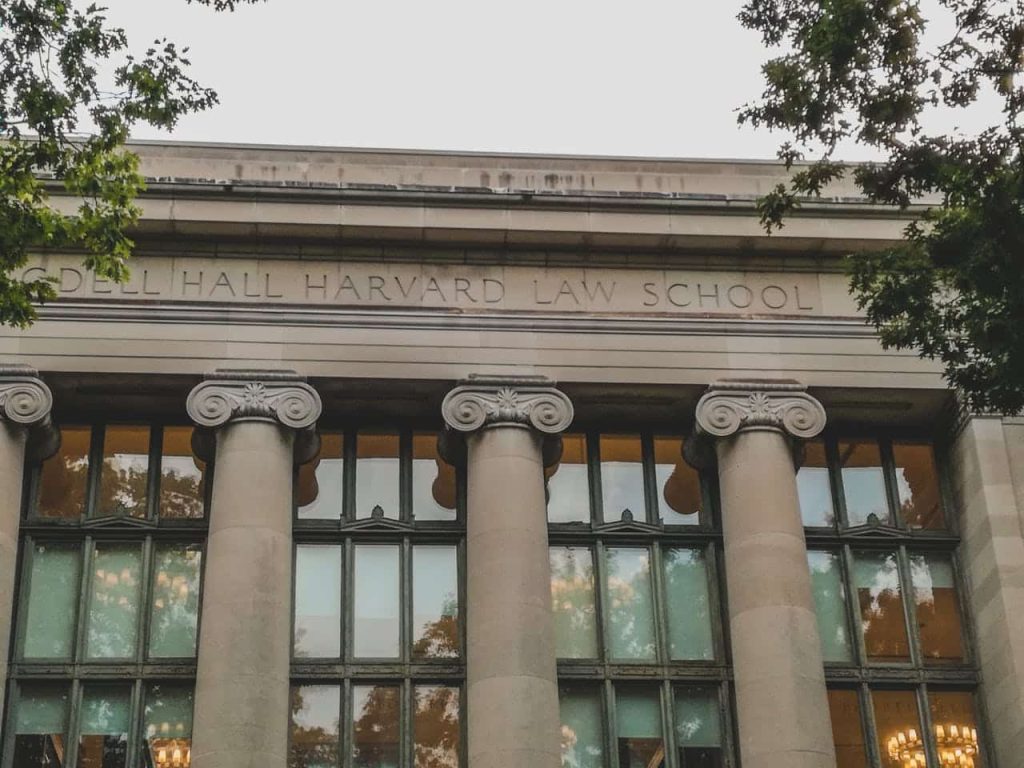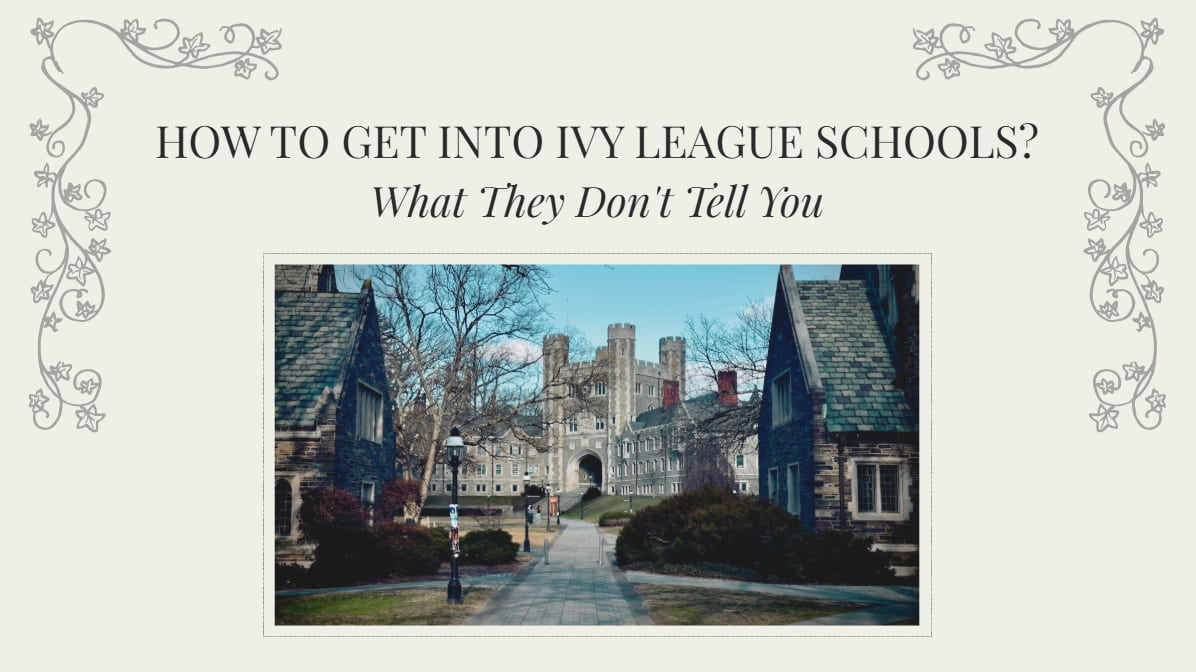Most students are both excited and nervous when they ask me how to get into Ivy League colleges. These places have some of the lowest acceptance rates in the world, but I always tell them, “It’s not impossible.” I’ve seen that getting in doesn’t depend on being perfect, but on telling a story that makes admissions officers want to remember you.
I have worked as a college admissions consultant for many years, and I will now share with you what has worked for my students over the years. This covers some secret tips that aren’t just “get good grades.
What Are the Ivy League Colleges?
Whenever I talk to students about this topic, the first thing I explain is what the Ivy League is. Many think “Ivy League” simply means “top schools,” but in reality, it’s an athletic conference made up of eight private universities in the northeastern United States.
Below is the list of all Ivy League colleges:
- Harvard University – Based in Cambridge, Massachusetts. This university is known for its history, influence, and academic prestige.
- Princeton University – Strong focus on undergrads and a campus that looks straight out of a movie set.
- Yale University – Top-notch arts programs, an amazing drama school, and of course, prestigious law school.
- Columbia University – Right in the heart of New York City, Columbia mixes Ivy League academics with big-city energy.
- University of Pennsylvania – Home to the Wharton School of Business and tons of opportunities for pre-professional programs.
- Dartmouth College – A smaller Ivy with a tight-knit community and a strong liberal arts vibe.
- Brown University – An open curriculum, which lets students build their academic path with tons of flexibility.
- Cornell University – The Ivy with something for everyone, from world-class engineering to a highly respected hospitality program.
Over time, these schools became known for sports, academic excellence, world-class faculty, and impressive alumni networks. Each one has its own culture, strengths, and admission quirks. It means your application strategy might look slightly different depending on the school you target.

What Are the Requirements to Get Into Ivy League Colleges?
From what I’ve seen, meeting academic standards is only the beginning. What counts most is how you tell your story and make an effect.
High GPA and Rigorous Coursework
A strong GPA, typically 3.8–4.0 (unweighted), is one of the first things Ivy League admissions officers look at. But the classes you take matter just as much. So, if your school offers honors, AP, IB, or dual-enrollment classes, take advantage of those and excel in them to increase your chances.
In sum, excellent grades in a tough course load are essentially expected.
For perspective, at Princeton, over 59% of incoming students had a perfect 4.0, and the average GPA was about 3.92 in one recent class cohort.
Top SAT or ACT Scores
While many Ivy League schools are now test-optional, strong standardized test scores still carry weight and can give you an edge over other applicants. That said, successful Ivy League applicants usually present very high scores.
For instance, the middle 50% of enrolled first-year students at Princeton scored 34–35 on the ACT composite, and about 1510–1580 (out of 1600) on the SAT. Similarly, Yale reports an 80% range of roughly 31–36 on the ACT.
In practice, a SAT in the mid-1500s or an ACT in the mid-30s aligns with the typical Ivy admit profile.
Impressive Extracurricular Activities
Grades and test scores open the door, but extracurriculars are what make admissions officers remember you. I always advise students to focus on activities that truly matter to them, whether it’s leading a club, starting a small business, or creating a community project.
Winning awards at the state or national level, participating in research programs, or showing long-term commitment to one or two activities will be far more impressive than being “just a member” of ten clubs. Quality and impact matter more than quantity.
In other words, admissions readers will be asking: What did you do outside of class, and how did you make a difference or grow from those experiences?
Overall, being an “interesting” candidate with talents, curiosity, and leadership outside the classroom is a must.
Strong Personal Essays
Your essays are your chance to speak directly to the admissions committee. They want to hear your voice — your real story, your perspective, and the “why” behind your goals.
To make your application memorable, you can write about a challenge you overcame or a passion that shaped who you are today . Avoid clichés or writing what you think they want to hear. Remember: authenticity is far more powerful.
Yale’s guidance, for example, advises applicants to “write about something that matters to you” and to use your own voice, rather than trying to impress with big words or overly polished language.
Powerful Recommendation Letters
Admissions committees at Ivy League schools heavily weigh recommendations as proof of your intellectual passion, character, and fit. That’s why you must choose teachers or mentors who have seen your best work and understand your strengths on a deeper level.
I often suggest giving your recommenders a short “brag sheet” of your accomplishments and goals so they can write specific examples rather than a vague endorsement.
A great recommendation letter fills in gaps and highlights personal qualities that aren’t obvious from your grades and test scores.
Easiest Ivy League Colleges to Get Into
The truth is, none of them are easy. Every Ivy League school is highly selective, but some have slightly higher acceptance rates compared to the toughest ones.
However, if you’re wondering about the easiest Ivy League colleges and universities to get into, I usually point to several prestigious schools.
🏔️ Cornell University, for example, tends to have the highest acceptance rate among the Ivies (around 9-11% in recent years). There is a wide variety of programs, from engineering to hotel management. Therefore, applicants with diverse strengths have more opportunities to stand out.
🌲 Dartmouth College is also considered a “more attainable” Ivy, partly because of its smaller size and tight-knit campus vibe. That said, Dartmouth still looks for students who show strong leadership, intellectual curiosity, and a sense of community.
📚 Brown University is another school that students often see as slightly more accessible, but don’t let that fool you. Their open curriculum attracts highly creative and motivated students. That’s why the admissions team looks for independent applicants with a strong academic drive.
In my opinion, focusing on the “easiest Ivy” isn’t always the best approach. It’s better to find a school where your interests, personality, and future goals align with what the university values. Once you understand that fit, you’ll have a stronger application and a better chance to get into a top school.
Hardest Ivy League Colleges to Get Into
When students ask which Ivy League institution is the hardest to get into, I always mention four options. These highly selective colleges have some of the lowest admission rates in the country, often between 3–5%.
As private schools with global prestige, they attract tens of thousands of applicants, including many international students, all competing for a minimal number of seats.
🎓 Harvard University is well-known for its unmatched reputation and rigorous admission process. With an acceptance rate hovering around 3–4%, it admits students who excel academically and, at the same time, show leadership, initiative, and unique personal achievements.
🐯 Princeton stands out for its strong focus on undergraduate education and high academic standards. The admissions process here is holistic. It means they consider more than just your test scores when evaluating how you’ll contribute to the campus community.
📖 Yale is another Ivy League institution with extremely low admission rates. From my experience, Yale values intellectual curiosity, creativity, and a passion for learning. These traits are considered as much as grades or test scores.
🗽 Columbia University, a private school in the heart of New York City, is also among the hardest Ivy League colleges to get into. Its location, strong core curriculum, and global opportunities make it a top choice for both U.S. and international students. This factor increases competition.
All these schools set the bar incredibly high, with specific requirements for academic performance, extracurricular activities, and personal essays.
How to Get Admission Into Ivy League Colleges?
The truth is, there’s no single formula, but there are proven ways to boost your chances of admission.
Ivy League universities want unique qualities and experiences that show leadership, curiosity, and impact. As a high school student, you can start building your profile throughout high school by focusing on academics, extracurriculars, and personal growth while paying close attention to application deadlines.
So, here are my top tips based on years of experience guiding students to success.
1 – Focus on Admission Requirements
To apply to an Ivy League, you need to meet and exceed their admission requirements. It means maintaining a high GPA, taking challenging classes, and excelling in standardized tests (if you choose to submit them).
Remember, Ivy League schools look for students who push themselves academically, so select AP, IB, or honors courses whenever possible.
2 – Show Your Extracurriculars and Research Opportunities
Admissions officers love seeing commitment and passion in a few areas rather than a long list of random activities. That’s why I advise you to pursue leadership roles, community projects, or research opportunities that match your interests.
Also, note that Ivy League universities value students who create impact both inside and outside of school.
3 – Consider the Common Application
Most Ivy League schools use the Common Application, so make sure every section reflects your best self. Your essays, activities list, and personal statement should highlight your values, interests, and character.
I always tell students to treat the Common App as their personal marketing tool — it’s your story, told your way.
4 – Add Unique Qualities and Experiences
Ivy League schools often look for applicants who bring something special to their campus. So, think about what makes you stand out — maybe it’s a project you built, a cultural experience, or an unusual talent.
Just make some personal touches, and your application will be unforgettable.
5 – Apply Early and Stay Organized
Submitting your application through Early Action or Early Decision can slightly improve your chances of admission.
More importantly, start early and track all tasks to avoid last-minute stress. I recommend keeping a calendar to monitor essay deadlines, test dates, and recommendation requests. Sometimes, attention to application deadlines can be decisive.
Final Tips on How to Get into an Ivy League
After years of working with students, I’ve learned that getting admission to Ivy League schools is all about strategy, focus, and authenticity. The Ivy League admissions process is holistic. They evaluate every aspect of your college application, from your essays and extracurricular activities to your recommendations and overall narrative.
Finally, here are some last tips that students often forget but that can really help:
- Work closely with your teachers and school counselors. They will give honest advice and write recommendation letters that highlight your character and effort in ways you can’t write about yourself.
- It also helps to really understand each school’s personality. Ivy League universities are known for their commitment to undergraduate education, so show how you’ll add something meaningful to their campus life.
If the process feels overwhelming, the best college admission consultants can be a huge help. They know what these top colleges are looking for and can guide you on essays, interviews, and deadlines.

